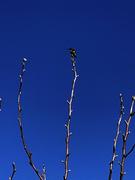 Hummingbirds hold medicine for us. The medicine is discovered through observation and a reading of the poetry by the late Mary Oliver.
Hummingbirds hold medicine for us. The medicine is discovered through observation and a reading of the poetry by the late Mary Oliver.
Poetry releases our moorings to the docks of sorrow, regret, human disappointments and the ghosts of our parents. It can transport us from frozen memories to the vibrant creative present. Mary Oliver offers us respite and an experiential taste of the power of the poem in conversation with the natural world in her poem entitled ‘Flare’. “When loneliness comes, consider the orderliness of the world.” In sifting through the pieces of our lives, particularly the sorrows of our parents who in turn, inoculated us with sorrow from the generations, she finds medicine in the sounds and sights of the creatures simply being themselves. The “burrowing beetle”; the hummingbird which brings a didactic of resiliency “shaking the water-sparks from its wings”… Who cannot be gripped with the tenacity of the hummingbird, its strength to “carry on” defying its seemingly insignificant size in the world? In the poetry of Mary Oliver, we take our medicine amidst the sifting and grieving, and sync both spirit and body once again, to the orderliness of the natural world. The poetry sync-up is never permanent, but is a discipline which fosters resilience which can be drawn upon when the disorderliness of childhood grief and trauma are touched. In her poem, Hummingbird Pauses at the Trumpet Vine, Mary Oliver pushes us to “be here now”, to experience a moment in time that takes us out of time. Our medicine is to “live into the now”, to not be caught the past’s sorrows, and to not be found hoping the future will come sooner so as to relieve us of living here now. Our medicine is to live in to the now, allowing ourselves to be regularly gripped with bodily experiences of awe. It is these experiences of awe which can be found in poetry as a spiritual practice, that can solidify our daily lives and give meaning to this brief journey in the experience of time, “like the pale stones that almost last forever”.
